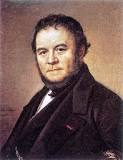The Red and the Black Page #15
Le Rouge et le Noir is a historical psychological novel in two volumes by Stendhal, published in 1830. It chronicles the attempts of a provincial young man to rise socially beyond his modest upbringing through a combination of talent, hard work, deception, and hypocrisy.
As for her, she respected him, she admired him, and she had been scolded by him. Under the pretext of making up for the involuntary humiliation which she had caused him, she indulged in acts of the most tender solicitude. The novelty of these attentions made Madame de Rênal happy for eight days. Their effect was to appease to some extent Julien's anger. He was far from seeing anything in them in the nature of a fancy for himself personally. "That is just what rich people are," he said to himself--"they snub you and then they think they can make up for everything by a few monkey tricks." Madame de Rênal's heart was too full, and at the same time too innocent, for her not too tell her husband, in spite of her resolutions not to do so, about the offer she had made to Julien, and the manner in which she had been rebuffed. "How on earth," answered M. de Rênal, keenly piqued, "could you put up with a refusal on the part of a servant,"--and, when Madame de Rênal protested against the word "Servant," "I am using, madam, the words of the late Prince of Condé, when he presented his Chamberlains to his new wife. 'All these people' he said 'are servants.' I have also read you this passage from the Memoirs of Besenval, a book which is indispensable on all questions of etiquette. 'Every person, not a gentleman, who lives in your house and receives a salary is your servant.' I'll go and say a few words to M. Julien and give him a hundred francs." "Oh, my dear," said Madame De Rênal trembling, "I hope you won't do it before the servants!" "Yes, they might be jealous and rightly so," said her husband as he took his leave, thinking of the greatness of the sum. Madame de Rênal fell on a chair almost fainting in her anguish. He is going to humiliate Julien, and it is my fault! She felt an abhorrence for her husband and hid her face in her hands. She resolved that henceforth she would never make any more confidences. When she saw Julien again she was trembling all over. Her chest was so cramped that she could not succeed in pronouncing a single word. In her embarrassment she took his hands and pressed them. "Well, my friend," she said to him at last, "are you satisfied with my husband?" "How could I be otherwise," answered Julien, with a bitter smile, "he has given me a hundred francs." Madame de Rênal looked at him doubtfully. "Give me your arm," she said at last, with a courageous intonation that Julien had not heard before. She dared to go as far as the shop of the bookseller of Verrières, in spite of his awful reputation for Liberalism. In the shop she chose ten louis worth of books for a present for her sons. But these books were those which she knew Julien was wanting. She insisted on each child writing his name then and there in the bookseller's shop in those books which fell to his lot. While Madame de Rênal was rejoicing over the kind reparation which she had had the courage to make to Julien, the latter was overwhelmed with astonishment at the quantity of books which he saw at the bookseller's. He had never dared to enter so profane a place. His heart was palpitating. Instead of trying to guess what was passing in Madame de Rênal's heart he pondered deeply over the means by which a young theological student could procure some of those books. Eventually it occurred to him that it would be possible, with tact, to persuade M. de Rênal that one of the proper subjects of his sons' curriculum would be the history of the celebrated gentlemen who had been born in the province. After a month of careful preparation Julien witnessed the success of this idea. The success was so great that he actually dared to risk mentioning to M. de Rênal in conversation, a matter which the noble mayor found disagreeable from quite another point of view. The suggestion was to contribute to the fortune of a Liberal by taking a subscription at the bookseller's. M. de Rênal agreed that it would be wise to give his elder son a first hand acquaintance with many works which he would hear mentioned in conversation when he went to the Military School. But Julien saw that the mayor had determined to go no further. He suspected some secret reason but could not guess it. "I was thinking, sir," he said to him one day, "that it would be highly undesirable for the name of so good a gentleman as a Rênal to appear on a bookseller's dirty ledger." M. de Rênal's face cleared. "It would also be a black mark," continued Julien in a more humble tone, "against a poor theology student if it ever leaked out that his name had been on the ledger of a bookseller who let out books. The Liberals might go so far as to accuse me of having asked for the most infamous books. Who knows if they will not even go so far as to write the titles of those perverse volumes after my name?" But Julien was getting off the track. He noticed that the Mayor's physiognomy was re-assuming its expression of embarrassment and displeasure. Julien was silent. "I have caught my man," he said to himself. It so happened that a few days afterwards the elder of the children asked Julien, in M. de Rênal's presence, about a book which had been advertised in the Quotidienne. "In order to prevent the Jacobin Party having the slightest pretext for a score," said the young tutor, "and yet give me the means of answering M. de Adolphe's question, you can make your most menial servant take out a subscription at the booksellers." "That's not a bad idea," said M. de Rênal, who was obviously very delighted. "You will have to stipulate all the same," said Julien in that solemn and almost melancholy manner which suits some people so well when they see the realization of matters which they have desired for a long time past, "you will have to stipulate that the servant should not take out any novels. Those dangerous books, once they got into the house, might corrupt Madame de Rênal's maids, and even the servant himself." "You are forgetting the political pamphlets," went on M. de Rênal with an important air. He was anxious to conceal the admiration with which the cunning "middle course" devised by his children's tutor had filled him. In this way Julien's life was made up of a series of little acts of diplomacy, and their success gave him far more food for thought than the marked manifestation of favouritism which he could have read at any time in Madame de Rênal's heart, had he so wished. The psychological position in which he had found himself all his life was renewed again in the mayor of Verrières' house. Here in the same way as at his father's saw-mill, he deeply despised the people with whom he lived, and was hated by them. He saw every day in the conversation of the sub-perfect, M. Valenod and the other friends of the family, about things which had just taken place under their very eyes, how little ideas corresponded to reality. If an action seemed to Julien worthy of admiration, it was precisely that very action which would bring down upon itself the censure of the people with whom he lived. His inner mental reply always was, "What beasts or what fools!" The joke was that, in spite of all his pride, he often understood absolutely nothing what they were talking about.
Translation
Translate and read this book in other languages:
Select another language:
- - Select -
- 简体中文 (Chinese - Simplified)
- 繁體中文 (Chinese - Traditional)
- Español (Spanish)
- Esperanto (Esperanto)
- 日本語 (Japanese)
- Português (Portuguese)
- Deutsch (German)
- العربية (Arabic)
- Français (French)
- Русский (Russian)
- ಕನ್ನಡ (Kannada)
- 한국어 (Korean)
- עברית (Hebrew)
- Gaeilge (Irish)
- Українська (Ukrainian)
- اردو (Urdu)
- Magyar (Hungarian)
- मानक हिन्दी (Hindi)
- Indonesia (Indonesian)
- Italiano (Italian)
- தமிழ் (Tamil)
- Türkçe (Turkish)
- తెలుగు (Telugu)
- ภาษาไทย (Thai)
- Tiếng Việt (Vietnamese)
- Čeština (Czech)
- Polski (Polish)
- Bahasa Indonesia (Indonesian)
- Românește (Romanian)
- Nederlands (Dutch)
- Ελληνικά (Greek)
- Latinum (Latin)
- Svenska (Swedish)
- Dansk (Danish)
- Suomi (Finnish)
- فارسی (Persian)
- ייִדיש (Yiddish)
- հայերեն (Armenian)
- Norsk (Norwegian)
- English (English)
Citation
Use the citation below to add this book to your bibliography:
Style:MLAChicagoAPA
"The Red and the Black Books." Literature.com. STANDS4 LLC, 2025. Web. 10 Mar. 2025. <https://www.literature.com/book/the_red_and_the_black_201>.








Discuss this The Red and the Black book with the community:
Report Comment
We're doing our best to make sure our content is useful, accurate and safe.
If by any chance you spot an inappropriate comment while navigating through our website please use this form to let us know, and we'll take care of it shortly.
Attachment
You need to be logged in to favorite.
Log In